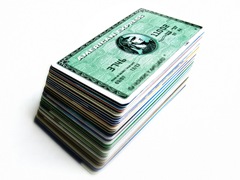[This Thursday rerun first appeared June 18, 2009.]
On Monday the New York Times ran a piece that, in a better world, would not have been news. Turns out that credit card companies are often willing to settle delinquent accounts for less than what is owed. Golly.
The article did contain an important tip for those in serious credit card trouble. When the card issuer calls you out of the blue and offers to let you  settle the whole thing for 80 cents on the dollar, you should, without hesitation or reflection, say no. Then hang up. They’re not calling because they think you’ll pay them eventually. That 80% is what we Wall Street types call a “first offer”.
settle the whole thing for 80 cents on the dollar, you should, without hesitation or reflection, say no. Then hang up. They’re not calling because they think you’ll pay them eventually. That 80% is what we Wall Street types call a “first offer”.
The Times piece tells the story of a guy who got a call like this, said no thanks, and then when the company called back a few weeks later, offered them 50%.
It’s a deal, the account representative immediately said, not even bothering to check with a supervisor.
Read more »
[This Thursday rerun first appeared August 5, 2009]
Last week the Baltimore Sun ran a list in picture gallery form of "Money Wasters to Avoid." It got picked up by the often amusing Consumerist, which  was then noticed by the WSJ’s [now, sadly, defunct] The Wallet, which is where my jaded mouse found it. And now I am going to write about it too.
was then noticed by the WSJ’s [now, sadly, defunct] The Wallet, which is where my jaded mouse found it. And now I am going to write about it too.
To be fair, this particular bit of sound in the blogosphere echo chamber hasn’t much substance and likely wasn’t intended to be taken very seriously. I imagine a few summer interns brainstorming a list of things people waste money on, rounding up some stock photos, and then poof, it’s internet content.
But if I limited myself to commenting on things that truly deserve comment this blog wouldn’t be much fun to write.
The thirteen wasters of money are: the lottery, books, eating out, pets, DVD rentals, ATM fees, cigarettes, coffee breaks, bottled water, designer clothing, car washes, speeding, and bars.
Read more »
[This Thursday re-run first appeared August 14, 2009]
If there is one topic that professional journalists just love to report on and analyze, it is the troubles of traditional newspapers. They’re in very bad shape, we are told, and if something is not done these vital institutions might just go away, obviously taking our civilization along with them. There are even pundits who quietly suggest that government subsidies are in order.
 What is most weird about this (spectacularly self-serving) sort of commentary is that it often actually understates the economic problems that newspapers face. Some papers may stagger on for a few more years or even a decade or two, but make no mistake, this patient is terminal.
What is most weird about this (spectacularly self-serving) sort of commentary is that it often actually understates the economic problems that newspapers face. Some papers may stagger on for a few more years or even a decade or two, but make no mistake, this patient is terminal.
Imagine, if you will, that newspapers didn’t exist. Now imagine somebody came to you with an exciting new business idea. His plan is to print the news of the day on paper overnight in massive printing plants and distribute copies to driveways in the wee hours throughout the region using a network of motorized vehicles. This operation would be paid for mostly by selling advertizing, but he would also have to charge about a dollar a day to readers.
You would tell this person he was crazy.
Read more »
[This Thursday re-run is from July 9, 2009.]
The latest hot topic on the identity theft front is a paper published on Monday in The Proceedings of the National Academy of Science by two professors at Carnegie Mellon on how easy it is to guess a person’s social security number.
 That day Ars Technica reported on it. Also, the authors of the paper started a blog on it. The AP picked it up Tuesday. CrunchGear blogged on it then too. And Wednesday brought posts from Wise Bread and Wallet Pop.
That day Ars Technica reported on it. Also, the authors of the paper started a blog on it. The AP picked it up Tuesday. CrunchGear blogged on it then too. And Wednesday brought posts from Wise Bread and Wallet Pop.
This is a great story. It combines several of my favorite themes. There’s the ever amusing hysteria over identity theft, which apparently renders a person incapable of rational thought and perspective. There are the unintended consequences of seemed-like-a-good-idea-at-the-time government policies. And there is the recurring phenomenon of folks who report and comment on academic papers without reading and/or understanding them.
Read more »
[This Thursday re-run first appeared July 24, 2009.]
Time for another episode in my continuing series People Are Idiots. Previous installments have included how to sell your students wine and how to get rich on the internet.
 Today we visit another phenomenon of cognitive misbehavior, what I like to call the Small Percentage Effect. (It has some other fancy name among behavioral economists. I like mine better.)
Today we visit another phenomenon of cognitive misbehavior, what I like to call the Small Percentage Effect. (It has some other fancy name among behavioral economists. I like mine better.)
Imagine that you have decided to buy the latest, totally cool and sexy, iPod. It retails for $200. You are about to pick it up at a shop near your home when you hear that all the way across town a store is running a one-day special promotion, selling this iPod for only $100. It is a 90 minute round-trip drive, but you gleefully head off to score your bargain iPod.
Read more »
 settle the whole thing for 80 cents on the dollar, you should, without hesitation or reflection, say no. Then hang up. They’re not calling because they think you’ll pay them eventually. That 80% is what we Wall Street types call a “first offer”.
settle the whole thing for 80 cents on the dollar, you should, without hesitation or reflection, say no. Then hang up. They’re not calling because they think you’ll pay them eventually. That 80% is what we Wall Street types call a “first offer”.


